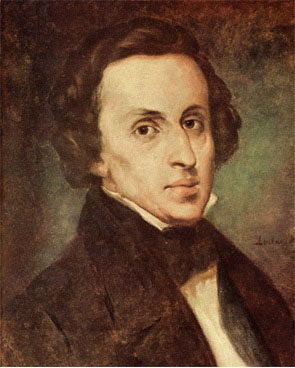Site about Music - Art & Math


 More than that of any other composer, the name of Chopin has become associated with one instrument- the pianoforte.
More than that of any other composer, the name of Chopin has become associated with one instrument- the pianoforte.
Frédéric François Chopin (/ˈʃoʊpæn/; French pronunciation: [fʁe.de.ʁik ʃɔ.pɛ̃]; 22 February or 1 March 1810 – 17 October 1849), born Fryderyk Franciszek Chopin,[at Zelazowa Wola, near Warsaw, on 1 March 1810. His father was Nicolas Chopin, born in Marainville, Vosges, in 1771. As a young man, Nicolas had left France to seek his fortune, served in the Polish National Guard, became a tutor of French in Polish aristocratic circles and, in 1810, was appointed as a teacher of French at the Warsaw Lyceum; soon after, he took a part-time post teacheing French at the Military School as well. He had married Justyna Krzyzanowska in June 1806.
In October 1810, when Chopin was seven months old, the family moved to Warsaw, where his father had accepted an offer from lexicographer Samuel Linde to teach French at the Warsaw Lyceum. The school was housed in the Saxon Palace, and the Chopin family lived on the palace grounds. In 1817 Grand Duke Constantine requisitioned the Saxon Palace for military purposes, and the Lyceum was moved to the Kazimierz Palace,which also hosted the newly founded Warsaw University. The family lived in a spacious second-floor apartment in an adjacent building. Chopin attended the Warsaw Lyceum from 1823 to 1826.
Fryderyk’s childhood was secure and happy.
Fryderyk constantly improvised pieces of his own which, at first, Zywny would note down for him. A Polonaise in G-minor was published in 1817, and Warsaw press commented with pride on the child’s achievements, both pianistic and creative: “ Geniuses are born in our country also, but the lack of publicity hides them from the public”. Fryderyk’s fame spread fast, and local ladies showered him with invitationas to play at their homes. Hailed as a second Mozart, he gave his first public performance at the Radziwill palace in 1818, aged eight, playing a piano concerto by Gyrowetz. In 1821 Fryderyk wrote a farewell Polonaise for Zywny, who admitted that there was nothing more he could teach the boy, and soon began taking composition lesson from Josef Elsner, director of the new Warsaw Conservatoire.
About this time, at the age of eleven, Chopin performed in the presence of Alexander I, Tsar of Russia, who was in Warsaw to open the Sejm (Polish Parliament). Tsar Alexander I gave him a diamond ring after hearing him perform on the latter.
In the summer holidays Fryderyk, always physically frail, was sent to the village of Szafarnia for country air, food and exercise. Here he heard traditional polish folk-music- a lifelong influence-and sketched some of his first mazurkas. After three years at the Lyceum(1823-1826), Fryderyk enrolled at the Conservatoire.
By 1830, when he first performed his Fantasia on Polish Airs(op.13), Chopin was already being hailed as Poland’s national composer. But virtuoso performers such as Paganini and Rummel showed him what could be achieved on the international scene, and in 1829 Chopin left Warsaw for Vienna. Always on the qui vive for something new, his audience responded warmly to the Polish themes he loved, and which became so characteristic of his music.
From Vienna he went to Paris, where he was lionized and became the admired friend of leaders of the Romantic movement such as Berlioz, Bellini, List and Meyerbeer.
From his recitals, and by giving lessons to the talented ( and pretty) daughters of wealthy families, he made enough money to live in style. After several unhappy love affairs he met the woman novelist George Sand in 1837. By now he was already suffering from tuberculosis, the disease that was to carry him off at a comparatively early age. A warm climate was recommended, and the lovers took up residence in Majorca, where he completed the 24 Preludes.
Winter in Majorca also proved disagreeable, so the couple returned to the comforts of Paris and of the George Sand’s country home at Nohant. For ten years Chopin lived in elegant seclusion, composing and teaching. But the great romance faded into friendship, and when the Revolution came in 1848 Chopin fled to England. Though desperately ill, he had to give public recitals to earn a living. In 1849 he returned to Paris, where he died on 17 October.